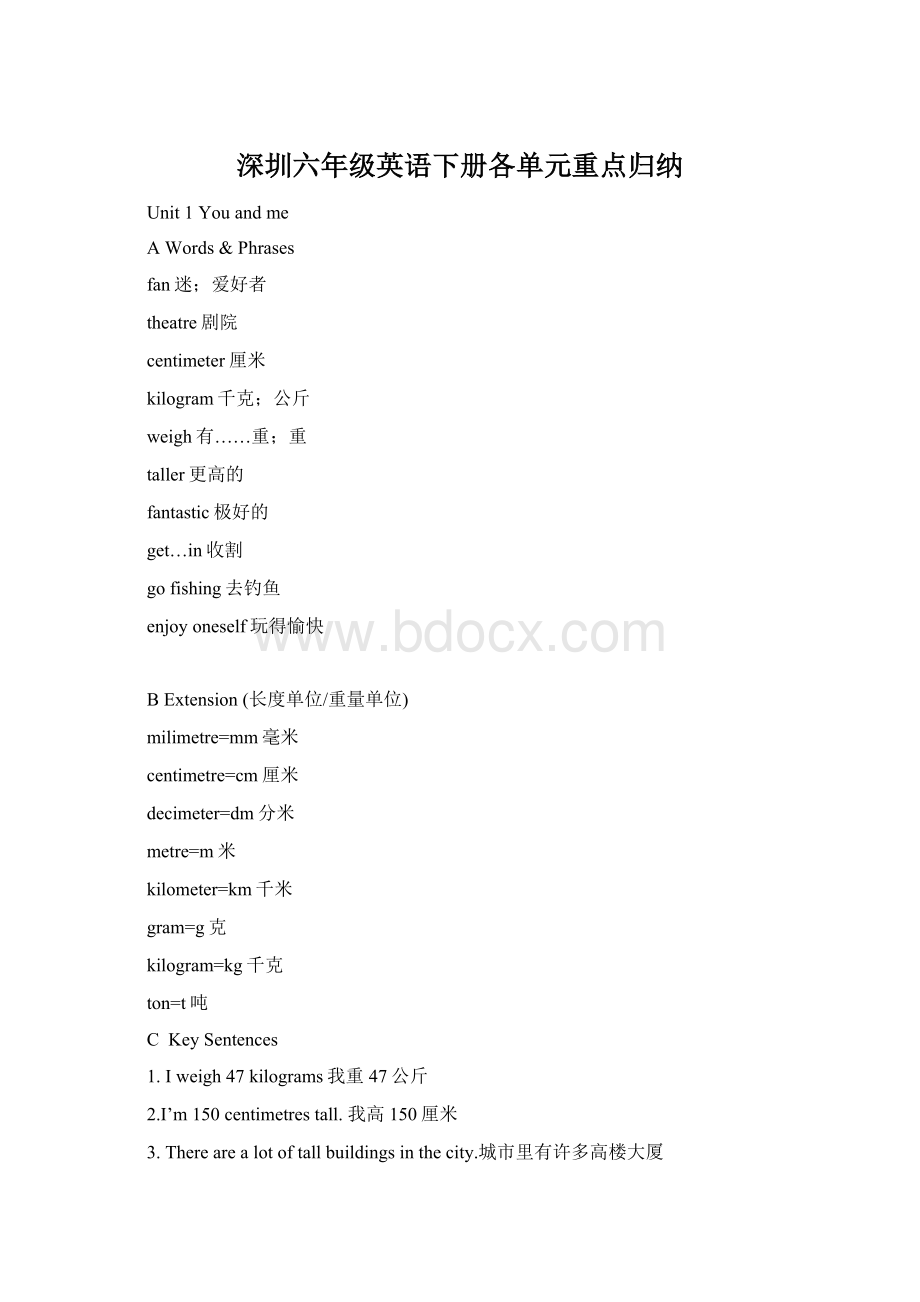深圳六年级英语下册各单元重点归纳.docx
《深圳六年级英语下册各单元重点归纳.docx》由会员分享,可在线阅读,更多相关《深圳六年级英语下册各单元重点归纳.docx(30页珍藏版)》请在冰豆网上搜索。

深圳六年级英语下册各单元重点归纳
Unit1Youandme
AWords&Phrases
fan迷;爱好者
theatre剧院
centimeter厘米
kilogram千克;公斤
weigh有……重;重
taller更高的
fantastic极好的
get…in收割
gofishing去钓鱼
enjoyoneself玩得愉快
BExtension(长度单位/重量单位)
milimetre=mm毫米
centimetre=cm厘米
decimeter=dm分米
metre=m米
kilometer=km千米
gram=g克
kilogram=kg千克
ton=t吨
C Key Sentences
1. I weigh47kilograms我重47公斤
2.I’m150centimetres tall.我高150厘米
3. There are a lot of tall buildings in the city.城市里有许多高楼大厦
4. I usually play football after school.我通常放学后踢足球
DLanguage Focus
1. ---How much do you weigh?
---I weigh 40 kilograms.
(1)“ How much do/does… weigh?
”用来询问物体的重量或他人的体重,回答用“主语 +weigh/weighs…kilogram(s).”。
例如:
---Howmuchdothe apples weigh?
这些苹果多重?
---They weigh1 kilogram.它们重1千克。
---How much does Joe weigh?
乔体重多少?
---He weighs47 kilograms.他重47公斤。
(2) weigh的名词形式是 weight,表示“重量”。
lose one’ s weight表示“减肥”.
2.---How tall are you?
---I am 152 centimetres tall.
“ How tall is/are…?
”用来询问他人的身高,回答用“主语+am/is/are…centimetres tall.”。
注意:
centimetre= centimeter。
例如:
How tall is Mary?
玛丽身高多少?
She is 130 centimetres tall.她身高130厘米。
3.复习 there be句型, there be句型表示“某处有(存在)某人或某物”。
(1)肯定句:
“ There is/are+名词+其他”例如:
There is a park behind my home.我家后面有个公园。
There are some apples in my bag.我的包里有些苹果。
(2)否定句:
“ There is/are not+名词+其他”也可用“ There is/ are no+名词+其他”来表达。
例There are not oranges on the table.= There are no oranges on the
table.桌子上没有桔子。
(3)一般疑问句:
“ Is/Are there…?
”注意:
在一般疑问句和否定句中some要改成any。
例如:
---Isthereabook/anybreadin your bag?
你的包里有一本书/一些面包吗?
---Yes, there is. /No, there isn’t.是的,有。
/不,没有。
---Are there any books on the table?
桌上有一些书吗?
---是的,有。
/不,没有。
Sounds
学习音素/ei/和/ai/
(1)字母a和字母组合a-e、ai、ay、eigh在单词中发/ei/
(2)字母i、y和字母组合i-e、igh、ie在单词中发/ai/
a/ei/babyfavouritepaper
a-e/ei/namemakeskaterace
ai/ei/afraidrainwait
ay/ei/waypaydayplay
eight/ei/weighteighty
I/ai/libraryFridayninth
i-e/ai/likebikeninekite
y/ai/whyshycrytry
igh/ai/nightfighthigh
ie/ai/tiepieliefried
Unit2Changesinourlives
AWords&Phrases
life生活(复数lives)
writer作家
drive驾驶
wish愿望;祝愿
poor贫穷的;差的
streetcleaner环卫工人
streetsweeper扫地车
sweep扫地
wife妻子
broom扫帚
fairy仙子;小精灵
digital数码的
photographer摄影师
film胶卷
byhand用手
rightaway立即;马上
inashorttime很快
BExtension
write(写)---writer(作家)
drive(驾驶)---driver(司机)
dance(跳舞)---dancer(舞者)
teach(教)---teacher(老师)
clean(打扫)---cleaner(清洁工)
play(玩)---player(运动员)
swim(游泳)---swimmer(游泳者)
photograph(摄影)---photographer(摄影师)
CKeySentences
1.In the past, she used a pen and paper to write her books. Now she uses acomputer.
过去,她用钢笔和纸来写书。
现在她用电脑(来写书)
2.I’d like to give you three wishes.我可以满足你三个愿望。
3.. In the past, she got her crops in by hand. Now she uses a
machine.过去,她用手收割庄稼。
现在,她用机器(来收割庄稼)。
Unit3Ourschoolinthefuture
A.Words&Phrases
carry背;提;拿
mountain山;山脉
even甚至
space太空
PS附言(用于信末)
dinosaur恐龙
online在线地;在线的
headteacher校长
apieceof一张;一片
haveapicnic去野餐
betterandbetter越来越好
BKeySentences
1.Whatchangeswouldyouliketoseeinourschool?
你想看到我们的学校里发生了什么变化?
2.Studentswillhaveapicniceverymonth.
学生们每个月将会有一次野餐。
3.Iwillbetheheadteacher.我将会成为校长。
CLanguageFocus
1.谈论将来发生的事情,需要用到一般将来时。
用“will+动词原形”和“begoingto+动词原形”两种结构来表示将来时,具体形式见
下表:
复习一般将来时
定义:
(1)说话人认为将来会发生的事情。
(2)计划、打算将来要做的事情
关键词:
tomorrow,tomorrowmorning…,nextyear/month/week…,in+将来年份,in+时间段,inthefuture,soon,fromnowon等
结构
will+动词原形
begoingto+动词原形
肯定句
主语+will+动词原形
主语+am/is/are+notgoingto+动词原形
否定句
主语+willnot/won’t+动词原形
主语+am/is/aregoingto+动词原形
一般疑问句
Will+主语+动词原形+…
肯定回答:
Yes,主语+will.
否定回答:
No,主语+won’t.
Am/Is/Are+主语+goingto+动词原形+…
肯定回答:
Yes,主语+am/is/are.
否定回答:
No,主语+am/is/arenot.
特殊疑问句
特殊疑问词+will+主语+动词原形
特殊疑问词+am/is/are+主语+goingto+动词原形+…?
2. be going to和will的区别
(1) be going to句型表示在近期内或马上就要发生的事情,表示“计划”;
be going to还表示有明显迹象表明,某事将要发生。
例如:
1).I’mgoingtowatchTVtonight.
2).Lookattheblackclouds;It’sgoingtorain.
(2)will句型表示事情将要发生的时间不具体或较远。
例如:
I will work hard in the future.将来,我会努力工作了。
3. there be句型的一般将来时:
“ There will be..”和“ There is/are going tobe….”,表示“某处将来有(存在)……”。
例如:
There will/ is going to be a library in the school.
学校里将来会有一个图书馆。
There will/are going to be many trees in our school.
学校里将会有很多树。
4. would like表示“想要”,用来表达愿望和意愿。
would like可与任何人称连用,没有人称和单复数变化, would在人称代词后常缩写为“‘d”。
(1)主语+ would like+名词,表示“某人想要(某样东西)”,主语+ would
like to+动词原形,表示“某人想要(做某事)”。
例如:
I would like some bread.=I’ d like some bread.我想要些面包。
I would ike to help you carry the books. = I’d like to help you carry the books.
(2)“Wouldyoulike+名词?
”和“Wouldyouliketo+动词原形?
”,都表示“你想要……吗?
”。
例如:
---Wouldyoulikesomecoffee?
你想来点咖啡吗?
---Yes,pleasure./Sure.好的,请给我来一点。
/当然。
---Wouldyouliketogowithme?
你愿意跟我一起去吗?
---Sure./Yes,I’dliketo.当然。
/是的,我愿意。
Sounds
学习音素/m/,/n/和/ŋ/
字母m在单词中发/m/;字母n在单词中发/n/;字母组合ng/n(k)/n(g)在单词中发/ŋ/。
m/m/mymanmayme
n/n/sunrainnosenot
ng/ŋ/thingwingsing
n(k)/ŋ/